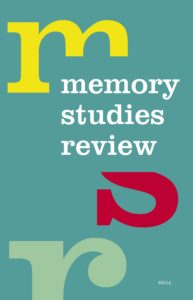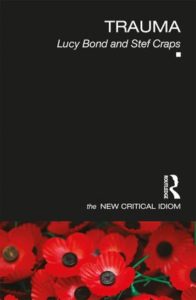Publications
Filter by type:
An Inconvenient Comparison: Climate Change through the Lens of the Holocaust
Trauma of Tomorrow: Navigating the Affective Terrain of Environmental Breakdown through Cultural Narratives
Historicizing Cultural Trauma
Trauma concepts have played a decisive role in the development of memory studies. The concepts provide excellent opportunities to acknowledge the ethical and political relevance of violent events of the 20th and 21st century because they allow memory studies experts to explore memories of violence from psychological, historical, literary, and media studies perspectives. How is the relationship between history and memory conceptualized in the interdisciplinary field of trauma studies, and what are the ethical and empirical limits of different trauma concepts?

Climate Witnessing
Call for Papers for a Special Issue of Memory Studies Review on “Climate Witnessing”
Guest-editors: Stef Craps (Ghent University), Rick Crownshaw (Goldsmiths, University of London), and Rebecca Dolgoy (Ingenium – Canada’s Museums of Science and Innovation)
The scale, complexity, and urgency of the global ecological crisis challenge the human capacity to grasp it, particularly within the context of daily life. Mass extinction, climate catastrophe, rampant pollution – concepts and phenomena that should not be understood as acceptable – have become “normal.” In its so-called fourth wave, memory studies has begun to remember the causes and effects of these characteristics of our new geological epoch, the Anthropocene – defined by the ascendant primacy of the human species in shaping the planet.
In confronting the Anthropocene, emergent scholarship and theoretically informed cultural practice (in the visual and plastic arts and museum exhibition curation) have drawn on memory studies’ existing repertoire of concepts of witnessing – given the ways witnessing has been theorized in relation to the complexity, extremity, and scale of events that defy representation. This special issue of Memory Studies Review explores how this normal abnormal of the Anthropocene might be witnessed in meaningful and transformative ways: to relate experience and observation to representation, knowledge, remembrance, and social action. More specifically, this issue asks how the climate crisis is or could be witnessed.
One of the challenges in developing the idea of climate witnessing is to acknowledge and decentre the human perspective. Witnessing is a human action, but in the climate crisis, what is witnessed is the interaction of the human and the nonhuman or more-than-human. The witness is not a discrete figure, transcendent of the surrounding environment, but instead immersed in and entangled with it. In turn, the representation, production, and circulation of what is witnessed are mediated by nonhuman and more-than-human things, processes, and forces, and, therefore, actants, as much as by human agency. It might be more accurate to speak of the witnessing of ecology and the ecology of witnessing.
Another way of putting this is to ask, what is being witnessed? Which agencies and actants? Just as there is not necessarily a discrete, bounded witness, so the events of the climate crisis are not contained but rather continually emerging. Actants (human, nonhuman, and more-than-human) interact – or, rather, intra-act with and mutually reconstitute each other – as they assemble with critical mass and force to become eventful and set in motion the making of other potential assemblages and repercussive chains of events. Or, put more generally, human perturbations of the environment set in motion complex causalities, feedback loops, and systemic changes.
Environmental change may be sudden, irruptive, and catastrophic but long in the making, as in the cumulative build-up and afterlife of atmospheric carbon dioxide and its climatic repercussions. Or change may remain undramatic, prolonged, imperceptible, and measured over multiple acts of witnessing or life spans of witnesses. What, then, of the temporality of witnessing? How can “events” be witnessed that might unfold over time scales beyond the typical duration of human acts of witnessing? How might memory studies be calibrated to conceptualize and theorize slow witnessing?
If climate witnessing is environmentally mediated, how should it incorporate or assemble the nonhuman and more-than-human as prosthetic or proxy witnesses? Nonhuman and more-than-human entities might serve evidentiary functions, marked by and registering climatic events, but to what extent can they be described as actual witnesses (as some ecocriticism might suggest)? The same questions apply to the synthetic (e.g. technological artefacts and infrastructures).
Of course, memory studies has a long history of analysing and theorizing the ways that objects, artefacts, and texts in cultural circulation mediate acts of witnessing and provoke remembrance in their capacities as material traces and representations of the past. However, to what extent are textual representations of climate change and institutional frameworks and elaborations of climate-related objects and artefacts calibrated and configured to the complexities of climate witnessing? How have archives, museums, and texts that are not intentionally climate-related become relevant as records of the climate catastrophe?
Finally, in memory studies, witnessing is often associated with juridical processes or confronting and addressing past and ongoing injustices. What happens to the ethics of witnessing when the witness to the climate crisis may well be implicated in the energy regimes responsible for climatic change?
We raise these questions by way of laying out some conceptual groundwork and some of the challenges to be considered for this special issue on climate witnessing. Our aim with this issue is to raise, address, and possibly untangle some of the challenges that emerge when one extends traditionally anthropocentric categories of witnessing to the nonhuman or more-than-human world. We also aim to elaborate a theory and practice of active, polyvocal, and inclusive climate witnessing that will function as one way that memory studies as a field can contribute to both academic and public discourses relating to the climate crisis.
We will gather articles from academics and practitioners (e.g. artists and curators) on topics ranging from elaborating the idea of climate witnessing to rich and diverse case studies. We also propose to develop a “climate witnessing collection” of artefacts, artworks, and objects that will be represented in the issue through images and brief captions. These can either be interspersed throughout the issue or appear in a standalone section.
Contributors may want to consider (but should not be limited to) the following themes:
- Climate witnessing and slow memory
- Climate witnessing and ecological grief
- Climate witnessing and ecocide
- Climate witnessing and climate trauma
- Climate witnessing and new materialism and/or posthumanism
- Climate witnessing and postmemory
- Climate witnessing and museum practice
- Climate witnessing and the archive
We invite 400-word abstracts on the topic of climate witnessing plus 200-word contributor bios, which should be sent as a single Word document to stef.craps@ugent.be, r.crownshaw@gold.ac.uk, and rdolgoy@ingeniumcanada.org by 15 January 2024. By 15 February 2024 selected contributors will be invited to submit a 6000-word essay or practice-based work, with a submission deadline of 1 June 2024. Publication of the special issue is scheduled for 2025.
Rouw om de planeet: Leven met verlies in het antropoceen
Verdriet, angst, wanhoop, schuldgevoelens en woede: geconfronteerd met de klimaatcatastrofe spelen verschillende emoties op, maar die krijgen vooralsnog weinig plaats en erkenning in de samenleving. Kunstenaars en activisten ontwikkelen ondertussen rouwpraktijken. Die zijn niet zaligmakend, maar wel noodzakelijk om voorbij het collectieve ontwijkingsgedrag te geraken.
Lost Words and Lost Worlds: Combatting Environmental Generational Amnesia
This essay explores the problem of society’s environmental memory loss and the potential for literary and cultural works to counteract it. It uses the concepts of environmental generational amnesia and shifting baseline syndrome to argue that our connection to the natural world has been eroded by our severely limited experience of it. Each generation’s perception of what is “normal” in nature is shaped by their own experience rather than an objective standard. As a result, we forget what we have lost and do not realize the full extent of environmental degradation that has occurred over time. People’s baseline expectations of the state of the environment are constantly being reset to a lower level as they are born into a world with fewer resources and a more degraded environment than the generation before. The essay examines two case studies to illustrate how creative works can play a vital role in reversing these trends and curing our planetary amnesia: The Lost Words: A Spell Book and its sequel The Lost Spells by Robert Macfarlane and Jackie Morris, and What Is Missing?, an interactive digital project by Maya Lin.
Klimaatrechtvaardigheid en de literaire verbeelding
Climate Justice and the Literary Imagination
This essay discusses a graduate course at Ghent University on the literary imagination of the climate crisis that pays particular attention to the ways in which creative writers address inequalities in the global distribution of responsibility for and vulnerability to climate change in their work. A selection of recent humanities scholarship theorizing climate change and its cultural framings and impacts provides a background for the analysis of a wide range of literary responses across different genres, from novels and short stories to graphic novels, poems, and plays. The essay focuses specifically on how questions of climate justice continually guide and inform classroom discussions, shedding light not only on texts that explicitly engage with such concerns but also, and perhaps especially, on texts that largely evade them.
“Island of No Birdsong": Towards an Archipelagic Poetics of Extinction
The Mnemonics Summer School: Reflections on a Decade of International Collaborative Doctoral Training in Memory Studies
The essay explores the roots, growth, and impact of the Mnemonics network, an international collaborative initiative aimed at providing doctoral training in memory studies. Since 2012, Mnemonics has organized an annual rotating summer school centred around specific themes in memory studies. The essay discusses the network’s grassroots origins, the way it operates, its efforts to maintain openness, and the factors that account for its endurance. Acknowledging the challenges of expansion and inclusivity, it concludes by reflecting on how Mnemonics seeks to embody the true spirit of academia by nurturing intellectual growth and fostering collaboration and mutual support.
Literatuur, mensenrechten en leesgroepen: Reflecties over een interdisciplinair impactproject
Dat literatuur kan fungeren als een krachtig instrument voor maatschappelijke bewustwording en verandering is een te koesteren gedachte te midden van de polycrisis die de wereld doormaakt. Als geëngageerde literatuurwetenschapper leek het mij zinvol om in te zetten op het vergroten van de sociale impact van mijn onderzoeksobject én het onderzoek ernaar door het debat erover te voeden en aan te zwengelen via een bijzondere vorm van public outreach. In 2021 nam ik samen met mijn UGent-collega en jurist Eva Brems het initiatief om een impactproject op te starten rond literatuur en mensenrechten. Dat project heeft als doel begeleiders van leesgroepen voor volwassenen in Vlaanderen en Nederland hulpmiddelen aan te reiken om aan de slag te gaan met literatuur waarin mensenrechtenthema’s een prominente rol spelen.
Guilty Grieving in an Age of Ecocide
This essay seeks to demonstrate the value of different guilt-ridden and grief-stricken cultural forms and social practices in helping us develop a new emotional literacy to navigate the challenges of environmental breakdown and collective responsibility. It examines three case studies – Octavia Cade’s novella The Impossible Resurrection of Grief, Chris Jordan’s documentary film Albatross and the self-immolation of David Buckel – that illustrate the complex interplay between environmental guilt and grief, showing how these emotions can serve as motivators for positive change and contribute to ecological attunement. The essay emphasises the importance of moving beyond individualised guilt to a collective understanding of environmental responsibility and offers insights into the potential of guilt and grief to drive meaningful action in addressing the ecological crisis.
Ecological Mourning: Living with Loss in the Anthropocene
The Anthropocene, the new geological epoch defined by the transformative impact of human activity on the planet, has seen a dramatic increase in the pace, scope, and severity of various kinds of environmental degradation, including climate change, biodiversity loss, and pollution. Moreover, according to a plethora of bleak scientific reports, these trends show little sign of abating, boding ill for the future of humanity and life on Earth in general. The experience and anticipation of environmental loss — whether of plant and animal species, ecosystems, landscapes, or an inhabitable planet — cause profound sorrow, which is being felt more and more acutely by a growing portion of the world’s population as we move ever deeper into the Anthropocene. However, as yet, we are somewhat at a loss as to how to adequately navigate the affective terrain of environmental breakdown. Lacking standard protocols and procedures, we do not quite know how to make sense of, channel, or cope with its psychological impact.
This essay will explore how literature, and art more generally, serves as a cultural laboratory for articulating and dealing with grief related to environmental loss, which remains largely unspoken and unrecognized. The act of naming the often disenfranchised and marginalized forms of grief arising from environmental loss is a major step in bringing them to public awareness and granting them social acceptance and legitimacy so that they can be processed more effectively. Coming to terms with ecological grief can inspire efforts to work through it and reinvigorate practices of environmental advocacy in the face of the daunting ecological challenges confronting global society in the twenty-first century.
The essay consists of three parts. First, I will explain why the very idea of ecological mourning meets with strong resistance in some quarters. I will go on to discuss the phenomenon of glacier funerals, which has helped ecological mourning overcome that resistance and go mainstream in recent years. I will end by discussing a newly published novella that offers a profound meditation on its perils, pitfalls, and possibilities: The Impossible Resurrection of Grief by Octavia Cade.
Stef Craps: ‘Globalizing One Particular Memory and Holding It Up as a Universal Moral Standard Risks Trampling or Blocking Out Other Memories’
Roundtable: Memory and Literature
Een Maus in de koolmijn
Memory Dynamics in Times of Crisis: An Interview with Sarah Gensburger
Working at the intersection of political science, ethnographic sociology, and contemporary historiography, Sarah Gensburger specializes in the social dynamics of memory. In this interview, she talks about her book Memory on My Doorstep: Chronicles of the Bataclan Neighborhood, Paris 2015–2016, which traces the evolving memorialization processes following the 2015 terrorist attacks in Paris, their impact on the local landscape, and the social appropriations of the past by visitors at memorials and commemorative sites. She also discusses her new project Vitrines en confinement—Vetrine in quarantena (“Windows in Lockdown”), which documents public responses to the coronavirus pandemic from different sites across Europe through the creation of a photographic archive of public space. The interview highlights issues around the immediacy of contemporary memorialization practices, the ways in which people engage with their local space during times of crisis, and how we are all actively involved in preserving memory for the future.
Literatuur en klimaathoop
Klimaatfictie tussen hoop en vrees
De vroege eenentwintigste eeuw zag een golf van literaire teksten waarin de klimaatverandering centraal staat. Dit artikel bespreekt wat tegenwoordig klimaatfictie of “cli-fi” wordt genoemd als een alternatieve vorm van klimaatcommunicatie, omarmd niet alleen door literatuurliefhebbers maar ook door wetenschappers en activisten die tegen de grenzen van het informatietekort-model aanlopen in hun pogingen om bewustwording en gedragsverandering te bewerkstelligen. Bijzondere aandacht wordt besteed aan de opkomende trend van hoopvolle, utopische klimaatverhalen als tegenwicht voor de dominantie van het post-apocalyptische genre, waarvan de effectiviteit steeds meer ter discussie staat.
Introduction to Octavia Butler’s Parable of the Sower
Fragment 95 and commentary for hand-written lockdown edition of Max Havelaar by Multatuli

Traag geweld: Kan kunst het klimaat redden?
Inleiding: Traag geweld: Kan kunst het klimaat redden?
Stef Craps en Mahlu Mertens
Gesprek met Nic Balthazar: “De verzoenbaarheid van kunst en activisme”
Stef Craps en Mahlu Mertens
Gesprek met Moya De Feyter: “Hoop is gewoon hard werken”
Stef Craps en Mahlu Mertens
Gesprek met Alexander Devriendt: “Het onmogelijke mogelijk maken”
Stef Craps en Mahlu Mertens
Gesprek met Christel Stalpaert: “De slagkracht van de verbindingsstreepjes”
Stef Craps en Mahlu Mertens
Poëtisch verzet tegen de teloorgang van de natuur
Leestip: Verloren woorden van Robert Macfarlane en Jackie Morris, vertaald door Bibi Dumon Tak.

